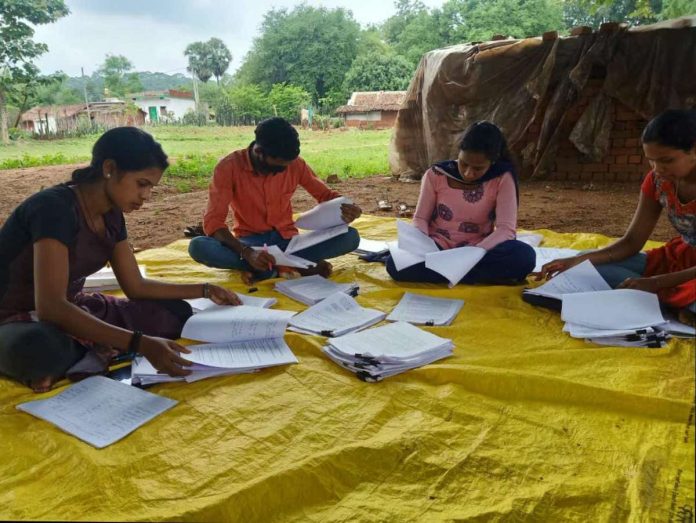
21-year-old Manju Patra is fighting against child marriage and domestic violence in an Odisha village
Date:

Share post:
History shows us that the paths of pioneers were never smooth. However, these indomitable souls never stepped back to fight against challenges and worked courageously to become the torchbearer of progressive society with equal rights and opportunities for everyone. Manju Patra, 21, a village girl from the Gond tribal community in Odisha is one of such motivators. Hailed from Kalahandi district of Odisha, which is infamous for famine and starvation deaths to be known as the “Ethiopia of India”, Manju has experienced a dark environment of violence against women and children as well as early and forced marriage of both boys and girls. This darkness is intensified with other disparities that are primarily rooted in the backwardness of the communities that live here.

To fight against these deep-rooted evils, she joined a collective of adolescent girls mentored by Oxfam India in 2017, which was working in her village to eradicate VAW (Violence Against Women) and CEFM (Child, Early, and Forced Marriage).
Manju’s fighting is driven by the sad story of her mother Sivararti Patra, a child marriage survivor. Sivararti was married to Nichal Patraat the age of 14; Manju’s father was also 17 at that time. Deprived of education, agency, and any knowledge about reproductive health, Sivararti gave birth to 14 children, out of which only four survived. It was found in the 2015-16 National Family Health Survey (NFHS-4) that about 22.9% of women aged 20-24 were married before they turned 18 in this district and 5.7% of girls are between the age of 15 and 19 who were already mothers or pregnant at the time of the survey. This pain, helplessness, and emotional and physical challenges faced by the women here inspired Manju to change the narrative of her own life.

After her higher secondary exam, she got an opportunity to get associated with Oxfam India and NAWO that has exposed her to feminist research on SRHR. It helped her to spread messages on the necessity of choice and consent in relationships, sexuality and ending period taboo. As a youth leader, Manju believes that only education can bring change, and awareness must begin at the school level. In Borbhat village, girls are not allowed to study beyond the 10th standard and get married before they even attain puberty. Manju was also dissuaded from studying further and her extended family wanted to get her married at the age of 15. Oxfam India has been a strong pillar of support in Manju’s fight against backwardness in the region. With Manju’s courage and motivation, villages girls can write, speak up, and study further now.
Manju herself is pursuing her bachelor’s in business management and has a keen interest in laws related to domestic violence, women’s rights, child marriage, and the right to education. As the president of the women’s group formed by the National Alliance of Women’s Organizations (NAWO), Odisha, she took the noble responsibility of sensitizing people via workshops and meetings about the negative consequences of gender inequality and child marriages.

She not only fought against child marriages and elopements in her village but enlightened the villagers about the importance of menstrual and sexual reproductive health in the meetings. Though there was a very low turn up in these meetings initially but it increases with time and now at least 20 members turn up every time. Apart from meetings, she spreads sex education among young girls, conducts workshops on gender-sensitive issues, and continually fights to abolish domestic violence. Her initiatives are not accepted openly by the villages and faced a strong backlash from them. She was even surveilled, followed around, and threatened to be defamed on social media using her picture.
Last year February, she met the CDPOs, police, and other stakeholders to stop a 20-year-old girl and a 16-year-old boy from getting married in her village. She was insulted and threatened by the boy’s parents, and a group even vowed to kidnap her. Nevertheless, there were many people in her village who have always supported her. For her endeavor to end CEFM in her village, Manju was felicitated by the Kalahandi district administration on Women’s Day this year.
With time, she has evolved as a brave and determined champion who has forged various change actions. She is no more humbled and threatened to hide her opinion and speaks her mind against social evils like CEFM and about sexual and reproductive health and rights (SRHR). She is spearheading change in her community by mobilizing young girls and boys for a better future.The pandemic has made it worse as the students stuck at home for a long time lost their interest in education. “This has led to many of them getting marriage proposals,” Manju says.

Manju feels highly satisfied when her youth collective is able to convince parents to give up discriminatory and superstitious ceremonies that isolate girls during menstruation or when the villagers allow their daughters to continue education. She says, “Until 2017, before these projects came into being, no girl in our community could ever imagine going to school beyond a certain age. What we are now seeing is the beginning of a revolution.”
